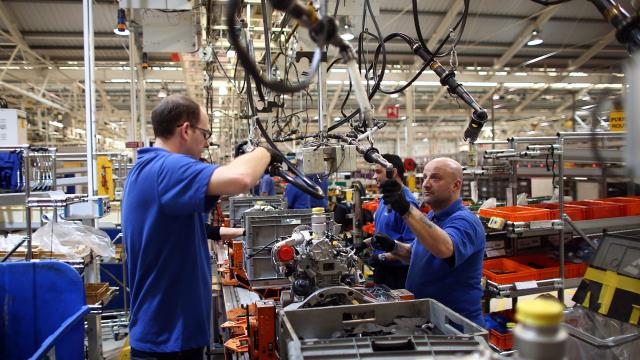In a sinister corporate nightmare where your bladder is a redundancy, it’s not surprising that warehouses would collect workers’ aggregate corporeal data, and a new company is testing the limits of what we’ll put up with. Bloomberg reports that major manufacturing and shipping companies are asking their manual laborers to strap on motion sensors ostensibly for their own safety, vibrating on their chests to alert them to potentially hazardous bends and twists. Employers then inspect workers’ every move, opening an obvious path to intensive micro-surveillance of their productivity.
From the most optimistic possible outlook of the history of the device, StrongArm’s Fuse worker activity tracking system seems like a noble idea which was squeezed by the pressures of the industry into a workplace surveillance tool with the potential to drive human bodily output just before the brink of its breaking point. The manufacturer StrongArm started out by working on “ergoskeletons,” protective torso gear which helps shift loads from the spine to core and leg muscles with a “posture feedback system.” But according to Bloomberg, the company soon pivoted to data collection, a sector in which there was a “much larger market.” Naturally.
StrongArm bills the latest iteration as something of a Fitbit for what it calls “industrial athletes.” Video demos on its site explain that the sensor harvests ergonomic data from the wearer’s ribcage at “12.5 times a second,” generating a “safety score” presented on a dashboard of points like “avg twist velocity” and “avg max flexion.” The idea is that it can be used to identify where workers are straining themselves so that StrongArm can advise the company to adjust, for example, the angle of its conveyor belts, and, in the words of COO Matt Norcia, coach employees “in the same way that a coach might help a professional athlete.” (StrongArm also regularly refers to workers as “professional athletes”—it’s never a good sign when companies start rebranding basic concepts like “worker.”)
In an email to Gizmodo, StrongArm says that they do not harvest biometric data or use GPS trackers, but they do collect environmental data such as humidity and air quality to alert warehouse owners to unsafe conditions. StrongArm further claims to Gizmodo that it terminates contracts with customers who may be abusing the data for any other use than the “well-being of their workforces.” That flawlessly vague choice of words is, of course, not an actionable policy but subjective criterion that’s virtually meaningless.
But well-being concerns the supply chain insofar as breaking your back is time-consuming. Geodis, a transport and shipping logistics company which uses StrongArm (as well as warehouse drones) in several warehouses, reportedly including some of Walmart’s, is very interested in monitoring devices for exactly the reasons you’d think. Mike Honious, Geodis COO tells Bloomberg, broadly, about tracking software: “We can actually break it down by the second…Then you apply the ergonomics data to the exact same timeline, and you can see the motions of the person bending, and what they’re doing. Then all of a sudden from there you can look at, ‘OK, is there an opportunity? Do we have a little bit of idle time? Was there some lifting that caused the operator to slow down?’”
“Every other form of [surveillance] technology has been misused by employers,” Lewis Maltby, president and founder of the National Workrights Institute, told Gizmodo. “This one will be too.” Maltby points to the example of Websense (now Forcepoint), which initially offered companies the option to block unsavoury websites at work, rather than monitor all of the employees’ browsing data. “A lot of us thought, this is perfect, employers can get better control with no privacy implications. Websense couldn’t sell the system. The only way was if they added a tracking ability to it.” Forcepoint disagrees with the characterization that its products are tools for workplace surveillance.
Workers concerned about having their every muscular contraction tabulated into the bottom line have no legal recourse to push back.
StrongArm founder Sean Petterson, a former construction worker, has told the BBC he “fell in love with the problem, not the solution.” Tech presents lots of “solutions” to “problems” that shouldn’t exist, such as robots potentially running people over. Verbal communication is another handy solution that unions traditionally provide, but only “some” of StrongArm’s clients are union shops.
StrongArm doesn’t seem to mind yielding to the authoritarian overlords because that’s the market. “StrongArm says that most of its clients are already gathering productivity data through other products, and so the use of its technology should raise no new concerns about surveillance,” Bloomberg reports.
Bosses lurk on Slack; UPS forces workers to explain their bathroom breaks; Amazon, which squeezes its employees to the extent that people are urinating in bottles for fear of retribution, has already been awarded a patent for similar technology under less altruistic auspices, a wristband that vibrates when workers reach for the wrong bin.
In the foreboding words of Petterson’s pitch at a 2018 FinTech conference:
“We’re managing [workers] based on what is the optimal output of their bodies while keeping them safe.”
StrongArm reports that 15,000 workers wear the tracking devices and hope to hit 35,000 by the end of 2020, at which point our brains’ emotion chips will surely have guaranteed that we’re all very, very happy and love our jobs very, very much.
